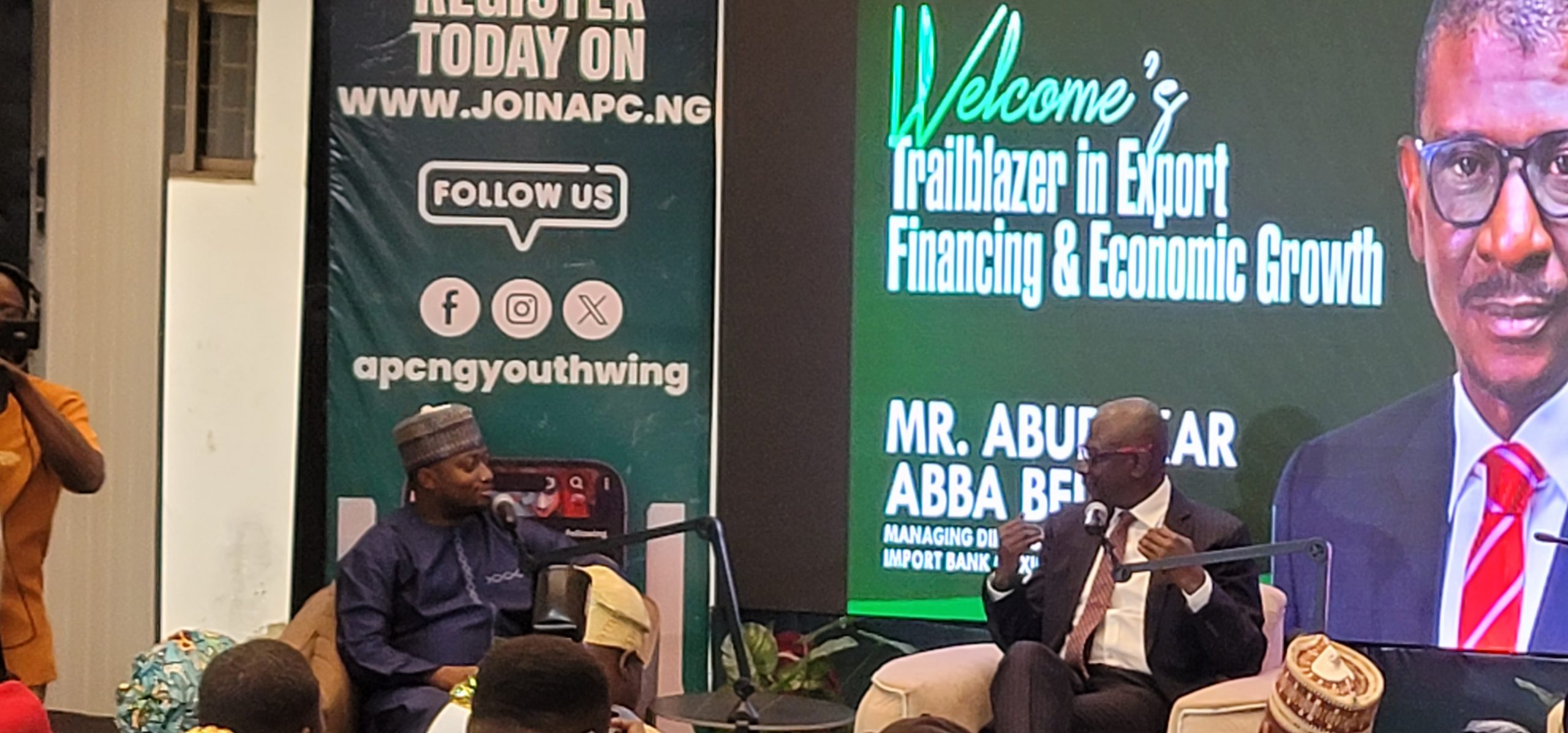Business
Invest in the Value Chain of Your Passion, NEXIM Boss Urges Nigerian Youth and Women

By Joel Ajayi
The Managing Director and Chief Executive Officer of the Nigerian Export-Import Bank (NEXIM), Abubakar Abba Bello, has called on Nigerian youth and women to pursue investment opportunities that align with their passions particularly within the non-oil value chains.
Mr. Bello made this call on Tuesday during an impactful session organized by the Youth Wing of the All Progressives Congress (APC), led by Dr. Dayo Israel. The event was part of an ongoing initiative designed to foster direct engagement between policymakers and citizens under the Renewed Hope Agenda, with the aim of strengthening national development.
The interactive session focused on educating young Nigerians, especially women, about the vast financing and entrepreneurial opportunities available within Small and Medium Enterprises (SMEs) operating in Nigeria’s non-oil sectors. Bello emphasized that greater youth participation in these sectors is critical for sustainable economic growth and long-term national prosperity.
“True success in business often comes when people invest in areas they are genuinely passionate about,” Bello noted. “Whether it’s agribusiness, services, the creative industry, or solid minerals—there is room for growth. NEXIM has a strong presence and offers support across all these value chains.”
He urged young people to channel their energy, creativity, and innovation into ventures that not only align with their interests but also contribute to national export development.
“What I want to appeal to the youth to do—and what I strongly encourage—is to invest where your heart is. Whether that’s in agriculture, processing, or the creative industries, you’re more likely to succeed when you’re passionate about what you do,” he said.
Bello highlighted the immense untapped potential within non-oil sectors and reaffirmed their importance in Nigeria’s ongoing economic diversification strategy.
“In all these value chains, Nigeria is yet to reach its full potential. But I believe the energy, intelligence, and creativity of our youth can make a significant difference. When young people engage in export-oriented ventures, the impact can be transformative.”
He also commended the APC Youth Wing for launching initiatives that encourage youth engagement in the export space, describing their efforts as both timely and strategic.
In his remarks, Dr. Dayo Israel, the APC National Youth Leader, reiterated his commitment to bridging the gap between citizens and government.
He explained that the initiative was born out of concerns from young Nigerians and women who often feel disconnected from policy-making processes.
“Many of our citizens, especially youth and women, have expressed frustration over limited access to policymakers. That’s why we launched this programme—to bring citizens and government representatives together for meaningful engagement,” Dr. Israel stated.
He further assured that he would “leave no stone unturned” in ensuring that the voices and needs of Nigerian youth are heard and addressed across all sectors of the economy
Business
FG, Investonaire Academy Unveil National Programme to Equip 100,000 Youths with Financial Skills, Digital Wealth Tools

By Joel Ajayi
The Federal Government, in collaboration with Investonaire Academy, has unveiled a nationwide financial literacy and wealth-building programme targeting more than 100,000 young Nigerians. The initiative is designed to equip participants with practical skills in budgeting, saving, investing, asset building, and long-term financial planning, positioning them for sustainable prosperity in a rapidly evolving economy.
Launched on Tuesday in Abuja, the Honourable Minister of Youth Development, Comrade Ayodele Olawande, described financial literacy as a necessary survival tool for young people confronting today’s economic realities.
He noted that the initiative represents the foundation of a broader vision expected to extend beyond Nigeria to other African nations and global markets.
Reaffirming the Federal Government’s commitment to supporting over 4,000 corps members annually, the Minister said the programme will provide platforms, resources, and skills needed for both job creation and employability.
“The young people who understand money — how to save, invest, build assets, and manage risk — are the ones who will lead Nigeria into prosperity,” he said.
A major highlight of the launch was the expansion of the Nigeria Youth Academy, a digital platform offering mentorship, training, and startup support. According to the Minister, more than 200 startups will receive empowerment through the Academy’s e-app platform before the end of the year.
He stressed the need for deeper collaboration with private organisations, innovators, and youth-focused groups, noting that government alone cannot drive youth development. He further encouraged young Nigerians to embrace skills acquisition, innovation, and digital enterprise, saying these remain critical to reducing the desire for migration and increasing self-reliance.
Outlining the Ministry’s long-term commitments, Olawande emphasized three priorities: supporting youth innovation, equipping them with growth tools, and safeguarding millions of Nigerian youths under the Ministry’s mandate.
Speaking at the launch, Sebastien Sicre, Chief Operating Officer of Investonaire Academy, said the programme was crafted to revolutionize the way Nigerian youths learn and apply financial knowledge. He highlighted the Academy’s gamified Learning Management System (LMS), which offers interactive learning tools, community forums, and real-time mentorship to make financial education engaging and accessible.
Complementing the digital platform is a new 200-square-metre physical training centre in Abuja, opposite the NNPC Towers, where in-person workshops and mentorship sessions will take place.
The curriculum covers key global asset classes — including equities, commodities, forex, and indices — ensuring participants gain a broad understanding of financial markets.
Sicre added that with Federal Government backing, the programme seeks to unlock new opportunities, strengthen youth participation in the digital economy, and reward outstanding participants through a $1 million funding pool to support new and existing ventures.
International Programme Director of Investonaire Academy, Dr. Enefola Odiba, explained that the initiative aims to bridge long-standing gaps in financial education among Nigerian youths. While schools teach many subjects, he said, essential financial skills are often missing.
“Many people can earn money — earning money can be easy. The real challenge is retaining, managing, and growing that money,” he noted.
Referencing the Central Bank of Nigeria’s definition of financial literacy, Odiba stated that implementation remains a major national challenge. He said the initiative brings together government agencies, youth groups, academic institutions, and private-sector partners to translate strategy into measurable impact.
The programme’s curriculum covers budgeting, saving, investing, and financial planning — areas where many young people struggle. By offering practical training, real-world insights, and guided mentorship, the initiative aims to build a generation of financially empowered youth capable of driving innovation, entrepreneurship, and sustainable economic growth.
With this partnership, the Federal Government and Investonaire Academy share a common goal: to empower young Nigerians with the financial intelligence and digital tools needed to build wealth, grow businesses, and transform the nation’s economic future.
-

 Featured6 years ago
Featured6 years agoLampard Names New Chelsea Manager
-

 Featured6 years ago
Featured6 years agoFG To Extends Lockdown In FCT, Lagos Ogun states For 7days
-

 Featured6 years ago
Featured6 years agoChildren Custody: Court Adjourns Mike Ezuruonye, Wife’s Case To April 7
-

 Featured6 years ago
Featured6 years agoNYSC Dismisses Report Of DG’s Plan To Islamize Benue Orientation Camp
-

 Featured4 years ago
Featured4 years agoTransfer Saga: How Mikel Obi Refused to compensate me After I Linked Him Worth $4m Deal In Kuwait SC – Okafor
-
Sports3 years ago
TINUBU LAMBAST DELE MOMODU
-

 News11 months ago
News11 months agoZulu to Super Eagles B team, President Tinubu is happy with you
-
Featured6 years ago
Board urges FG to establish one-stop rehabilitation centres in 6 geopolitical zones
